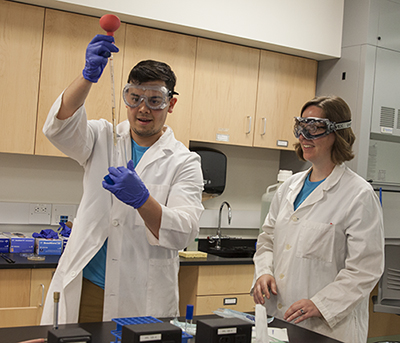Why study chemistry?
Chemistry is needed for a variety of careers. Classes at Parkland can prepare you for your future at a four-year institution. If you are interested in a career as a lab chemist or an art restorer, we've got you covered. Students can also explore health occupations. These include pharmacy, nursing, vet tech, and many others.
At Parkland, you'll have the advantage of small class sizes, taught by master faculty—never teaching assistants. Your success is our priority.

Classes
Introduction to Chemistry (CHE 100): Designed for those with little to no chemistry experience who expect to continue on to CHE 141–142.
Chemistry of Everyday Life (CHE 104): Explains the science behind everyday activities. For non-science majors only.
Chemistry for the Health Professions (CHE 106) and Chemistry for the Health Professions II (CHE 107): Introduction to the principles of chemistry with emphasis on general, organic, and biochemistry and their relationship to the health fields.
General Chemistry I (CHE 141): Introduces basic concepts of chemistry such as chemical names, formulas, reactions, atomic structure, properties, and solutions.
General Chemistry II (CHE 142): Explores equilibrium reactions, nuclear chemistry, properties of metals and nonmetals, and reaction rates.
Organic Chemistry I and Lab (CHE 203–204) and Organic Chemistry II and Lab (CHE 205–206): Advanced courses exploring various reactions and organic preparations.
Learn more about how these classes fit into a transfer degree or the general education core curriculum (GECC).